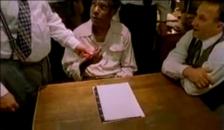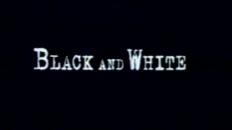AustLit
Latest Issues
AbstractHistoryArchive Description
'BLACK AND WHITE is based on a 1959 real-life trial in Adelaide, Australia, that went as far as the Privy Council in England. This film is a compelling drama about two young lawyers embarking on a battle for natural justice which has far reaching consequences both for themselves and Australian society.'
Source: Screen Australia. (Sighted: 7/8/2013)
Publication Details of Only Known VersionEarliest 2 Known Versions of
Works about this Work
-
Reconciliation and the History Wars in Australian Cinema
2012
single work
criticism
— Appears in: Exhuming Passions : The Pressure of the Past in Ireland and Australia 2012; (p. 207-222) 'When The Proposition ( a UK/Australia co-production, directed by John Hillcoat and scripted by Nick Cave) was released in 2005, film reviewers had no qualms about claiming this spectacular saga of colonial violence on the Queensland frontier as a 'history' film. A reviewer on BBC Radio 4 described The Proposition as 'a bushranger Western...set in violent 1880s Australian outback exposing the bitter racial tensions between English and Irish settlers. A Sunday Times review declared that 'Australia's brutal post-colonial history is stripped of all the lies in a bloody clash of cultures between the British police, the Irish bushrangers and the Aborigines.' Foregrounding the film's revisionist spectacle of colonial violence, an Australian reviewer predicted that, despite 'scenes of throat-cutting torture, rape and exploding heads...The Proposition could be the most accurate look at our national history yet'. (Author's introduction, 207)
-
y
 Witnessing Australian Stories : History, Testimony and Memory in Contemporary Culture
Melbourne
:
2010
6037495
2010
single work
thesis
Witnessing Australian Stories : History, Testimony and Memory in Contemporary Culture
Melbourne
:
2010
6037495
2010
single work
thesis
'This book is about how Australians have responded to stories about suffering and injustice in Australia, presented in a range of public media, including literature, history, films, and television. Those who have responded are both ordinary and prominent Australians–politicians, writers, and scholars. All have sought to come to terms with Australia's history by responding empathetically to stories of its marginalized citizens.
'Drawing upon international scholarship on collective memory, public history, testimony, and witnessing, this book represents a cultural history of contemporary Australia. It examines the forms of witnessing that dominated Australian public culture at the turn of the millennium. Since the late 1980s, witnessing has developed in Australia in response to the increasingly audible voices of indigenous peoples, migrants, and more recently, asylum seekers. As these voices became public, they posed a challenge not only to scholars and politicians, but also, most importantly, to ordinary citizens.
'When former Prime Minister Kevin Rudd delivered his historic apology to Australia's indigenous peoples in February 2008, he performed an act of collective witnessing that affirmed the testimony and experiences of Aboriginal Australians. The phenomenon of witnessing became crucial, not only to the recognition and reparation of past injustices, but to efforts to create a more cosmopolitan Australia in the present. This is a vital addition to Transactions critically acclaimed Memory and Narrative series.' (Publisher's blurb)
-
A Strange Time Machine : The Tracker, Black and White and Rabbit-Proof Fence
2009
single work
criticism
— Appears in: Creative Nation : Australian Cinema and Cultural Studies Reader 2009; (p. 166-179) -
Back Tracking
2003
single work
criticism
— Appears in: Meanjin , vol. 62 no. 1 2003; (p. 59-68) Examines some issues raised by the making of Australian films about Aboriginal people in historical settings by white filmmakers. -
Film
2002-2003
single work
review
— Appears in: Muse , December - January no. 224 2002-2003; (p. 18)
— Review of Black and White 2002 single work film/TV
-
Film
2002-2003
single work
review
— Appears in: Muse , December - January no. 224 2002-2003; (p. 18)
— Review of Black and White 2002 single work film/TV -
In Black and White
2002
single work
review
— Appears in: The Courier-Mail , 26 October 2002; (p. 12)
— Review of Black and White 2002 single work film/TV -
Long Harm of the Law
2002
single work
review
— Appears in: The Sunday Mail , 3 November 2002; (p. 65)
— Review of Black and White 2002 single work film/TV -
Melodrama Brings Crusaders Undone
2002
single work
review
— Appears in: The Sydney Morning Herald , 31 October 2002; (p. 16)
— Review of Black and White 2002 single work film/TV -
Shades of Grey
2002
single work
review
— Appears in: The Courier-Mail , 2 November 2002; (p. 10)
— Review of Black and White 2002 single work film/TV -
Back Tracking
2003
single work
criticism
— Appears in: Meanjin , vol. 62 no. 1 2003; (p. 59-68) Examines some issues raised by the making of Australian films about Aboriginal people in historical settings by white filmmakers. -
Reconciliation and the History Wars in Australian Cinema
2012
single work
criticism
— Appears in: Exhuming Passions : The Pressure of the Past in Ireland and Australia 2012; (p. 207-222) 'When The Proposition ( a UK/Australia co-production, directed by John Hillcoat and scripted by Nick Cave) was released in 2005, film reviewers had no qualms about claiming this spectacular saga of colonial violence on the Queensland frontier as a 'history' film. A reviewer on BBC Radio 4 described The Proposition as 'a bushranger Western...set in violent 1880s Australian outback exposing the bitter racial tensions between English and Irish settlers. A Sunday Times review declared that 'Australia's brutal post-colonial history is stripped of all the lies in a bloody clash of cultures between the British police, the Irish bushrangers and the Aborigines.' Foregrounding the film's revisionist spectacle of colonial violence, an Australian reviewer predicted that, despite 'scenes of throat-cutting torture, rape and exploding heads...The Proposition could be the most accurate look at our national history yet'. (Author's introduction, 207)
-
A Strange Time Machine : The Tracker, Black and White and Rabbit-Proof Fence
2009
single work
criticism
— Appears in: Creative Nation : Australian Cinema and Cultural Studies Reader 2009; (p. 166-179) -
y
 Witnessing Australian Stories : History, Testimony and Memory in Contemporary Culture
Melbourne
:
2010
6037495
2010
single work
thesis
Witnessing Australian Stories : History, Testimony and Memory in Contemporary Culture
Melbourne
:
2010
6037495
2010
single work
thesis
'This book is about how Australians have responded to stories about suffering and injustice in Australia, presented in a range of public media, including literature, history, films, and television. Those who have responded are both ordinary and prominent Australians–politicians, writers, and scholars. All have sought to come to terms with Australia's history by responding empathetically to stories of its marginalized citizens.
'Drawing upon international scholarship on collective memory, public history, testimony, and witnessing, this book represents a cultural history of contemporary Australia. It examines the forms of witnessing that dominated Australian public culture at the turn of the millennium. Since the late 1980s, witnessing has developed in Australia in response to the increasingly audible voices of indigenous peoples, migrants, and more recently, asylum seekers. As these voices became public, they posed a challenge not only to scholars and politicians, but also, most importantly, to ordinary citizens.
'When former Prime Minister Kevin Rudd delivered his historic apology to Australia's indigenous peoples in February 2008, he performed an act of collective witnessing that affirmed the testimony and experiences of Aboriginal Australians. The phenomenon of witnessing became crucial, not only to the recognition and reparation of past injustices, but to efforts to create a more cosmopolitan Australia in the present. This is a vital addition to Transactions critically acclaimed Memory and Narrative series.' (Publisher's blurb)
- South Australia,
- 1958




